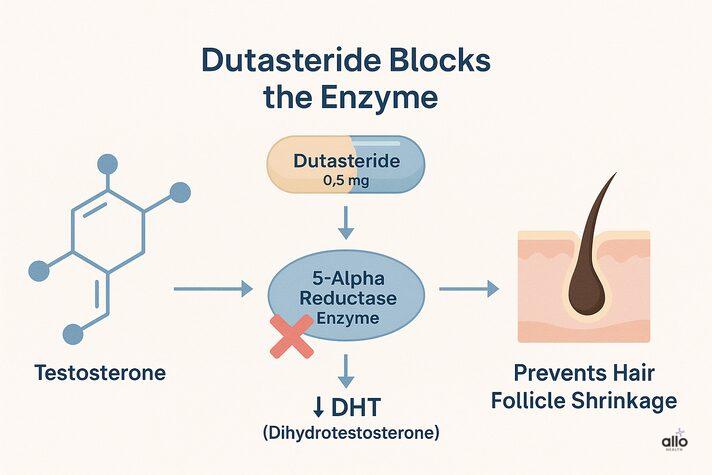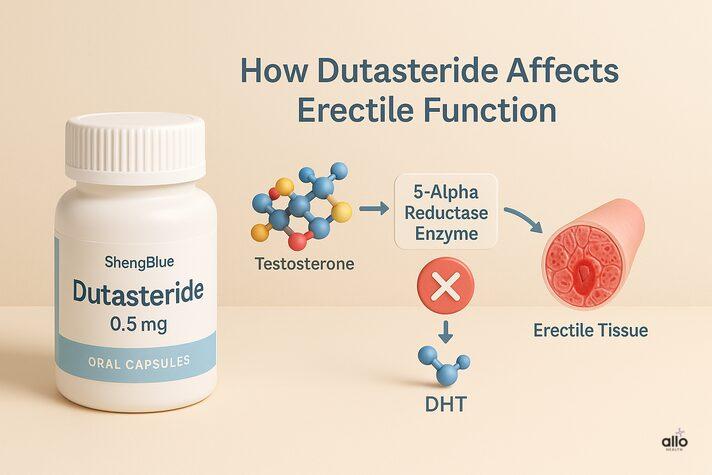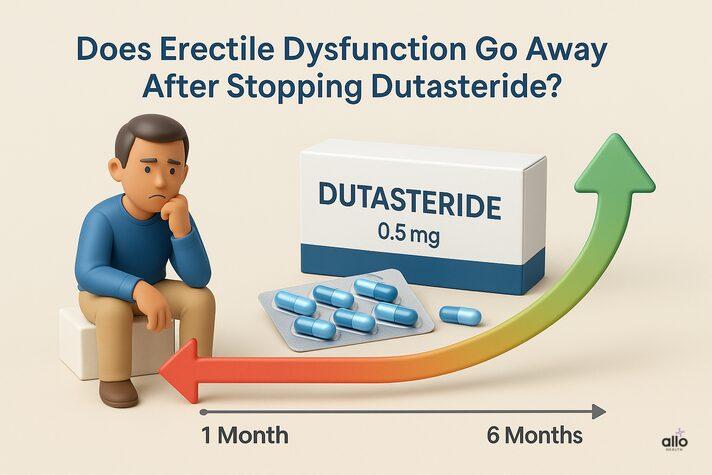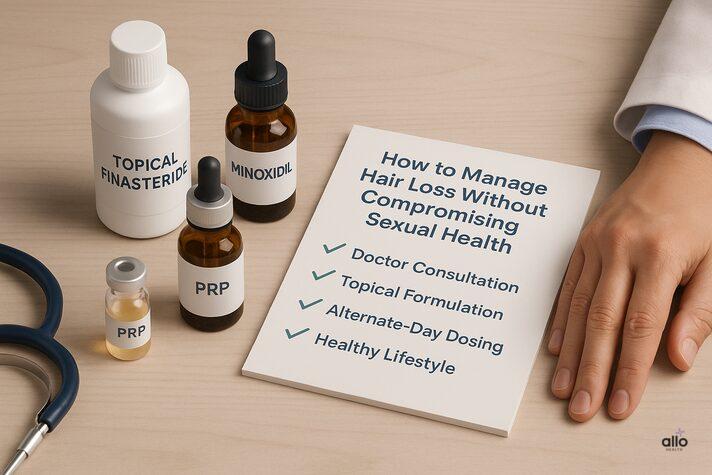Dutasteride and Erectile Dysfunction: Hair Loss Treatment Risks on Sexual Health

Dutasteride can cause erectile dysfunction by blocking enzymes that convert testosterone to DHT, affecting around 7-9% of users, typically within the first six months of treatment. The good news is that for most men, these sexual side effects are temporary and reverse within weeks to months after stopping the medication, though rare cases of persistent symptoms have been reported. If you're experiencing ED on Dutasteride, don't stop the medication abruptly, instead, consult your doctor about safer alternatives like topical formulations, alternate-day dosing, or non-hormonal options such as Minoxidil or PRP therapy. With proper medical guidance, you can manage hair loss effectively while protecting your sexual health, and temporary ED symptoms can often be treated with medications like Viagra or Cialis until hormone levels stabilize.
Dutasteride erectile dysfunction is a concern many men have when taking this medication for hair loss or prostate enlargement. Dutasteride works by lowering levels of a hormone called DHT, which helps prevent hair loss but can sometimes affect sexual function, including erectile function. If you’ve noticed changes in your erections, libido, or overall sexual performance, you’re not alone, and most importantly, these side effects are usually temporary.
In this article, we’ll break down how Dutasteride can cause erectile dysfunction, how common it really is, whether it goes away after stopping the drug, and the safest ways to manage hair loss without affecting your sexual health.

What Is Dutasteride Erectile Dysfunction?
Dutasteride is a 5-alpha-reductase inhibitor, a medicine used to treat conditions like hair loss and prostate enlargement. One known side effect of this drug is erectile dysfunction, along with decreased libido and ejaculation issues. These are among the most common sexual side effects linked to Dutasteride.[1]
The medicine works by blocking an enzyme called 5-alpha reductase, which normally converts testosterone into dihydrotestosterone (DHT). While DHT is important for maintaining normal male health, in some men with a genetic tendency for hair loss, excess DHT causes hair follicles to shrink, leading to thinning hair and baldness.
When Dutasteride lowers DHT levels, it helps reduce hair loss. But this hormonal shift can sometimes affect sexual function in a small percentage of men.
Compared to Finasteride, which blocks only one form of the 5-alpha reductase enzyme, Dutasteride blocks two forms. Studies[2] show that oral Dutasteride can reduce DHT levels by up to 90%, while Finasteride lowers them by about 70%.
According to Allo Health, every 1 in 2 patients has ED, which is based on our internal clinical data of more than 2.5 Lakh patients who come to our clinic.
Let’s look more closely at why Dutasteride may cause erectile dysfunction.

How Does Dutasteride Affect Erectile Function?
Dutasteride lowers levels of a hormone called dihydrotestosterone (DHT) by blocking the enzyme that converts testosterone into DHT. While this helps slow hair loss, it can also affect sexual function in some men.
The drug blocks both type I and type II 5-alpha reductase enzymes, leading to a sharp drop in DHT, over 90% in many cases. As DHT plays a key role in maintaining healthy erectile tissue and sexual desire, this big reduction can interfere with erections or cause a lower sex drive.
In large studies, about 7-9% of men taking Dutasteride reported erectile dysfunction, compared to 4–5.7% in those taking a placebo. Other reported side effects included decreased libido and ejaculation problems.[3]
In most cases, these effects are mild and reversible once the body adjusts or after stopping the medication. Understanding how Dutasteride affects hormones helps explain why these side effects happen, and why they don’t affect everyone the same way.

Does Erectile Dysfunction Go Away After Stopping Dutasteride?
Dutasteride-related erectile dysfunction usually appears within the first six months of treatment, with many men noticing the biggest changes in sexual function during the first month after starting the medication.
The good news is that, in most cases, these side effects are temporary and reversible. Clinical research shows that sexual function often improves once the body adjusts to lower hormone levels or after stopping Dutasteride completely.
But, there have been rare reports of persistent sexual dysfunction even after discontinuing the drug. This condition is sometimes referred to as “post-finasteride syndrome,” and although it’s more often linked to Finasteride, similar cases have been seen with Dutasteride as well[4].
Researchers are still studying why this happens in a small number of people. For most men, though, erectile function and libido return to normal within weeks or months after stopping Dutasteride, especially with proper medical support and healthy lifestyle habits.
Most men who take Dutasteride never experience erectile dysfunction. But for those who do, it’s usually temporary and improves once the medication is stopped or adjusted under medical guidance.

How to Manage Hair Loss Without Compromising Sexual Health
If you’re worried about losing hair and facing side effects like erectile dysfunction, there are safe ways to manage both. Here’s how:
1. Talk to Your Doctor First
Before changing or starting any medication, speak to a qualified healthcare professional. They can assess your condition, dosage, and risks, especially if you’re using Dutasteride or Finasteride.
2. Consider Topical Formulations
Research[5] shows that topical Finasteride can lower systemic absorption, which may reduce the chances of sexual side effects compared to oral tablets.
3. Try Alternate-Day Dosing (With Medical Guidance)
Your doctor might recommend taking Dutasteride every other day. This approach helps maintain hair-loss benefits while limiting hormonal changes linked to ED.
4. Explore Non-Hormonal Alternatives
If you want to avoid hormone-based drugs altogether, try:
- Minoxidil (topical) – promotes hair growth directly on the scalp
- PRP therapy – uses your own platelets to stimulate hair follicles
- Low-level laser therapy – boosts circulation and follicle health
- Lifestyle upgrades – balanced diet, less stress, good sleep, regular exercise
5. Stick to Your Prescription
Whatever option you choose, follow your treatment plan exactly. Don’t change doses or stop on your own; that can harm both your hair progress and your sexual health.
6. Manage Temporary ED With Treatment
If you experience erectile issues, PDE5 inhibitors like Viagra or Cialis may help until your hormone levels stabilize. Always use them under medical advice.
When To Talk to a Doctor
Reach out to your doctor if you notice:
- Erectile dysfunction lasting longer than 2-3 months
- Loss of libido or mood changes
- Any major shift in your sexual function
Never stop Dutasteride or Finasteride suddenly; always do it under a doctor’s supervision to ensure safe recovery and steady results.
Bottom Line
Dutasteride erectile dysfunction is real, though it doesn’t affect everyone. If you notice erection problems while taking Dutasteride, it’s important to talk to your doctor rather than stopping the medication on your own.
In most cases, erectile function returns within a few weeks or months after stopping the drug. But this decision should always be made under medical supervision, especially if you’re taking Dutasteride for benign prostatic hyperplasia (BPH) or male pattern hair loss, where it can offer significant benefits.
Remember, every individual responds differently. Your age, dosage, duration of use, and overall health can all influence how your body recovers. With the right guidance, most men find a treatment plan that supports both hair and sexual health safely.
"The following blog article provides general information and insights on various topics. However, it is important to note that the information presented is not intended as professional advice in any specific field or area. The content of this blog is for general educational and informational purposes only.
Book consultation
The content should not be interpreted as endorsement, recommendation, or guarantee of any product, service, or information mentioned. Readers are solely responsible for the decisions and actions they take based on the information provided in this blog. It is essential to exercise individual judgment, critical thinking, and personal responsibility when applying or implementing any information or suggestions discussed in the blog."






